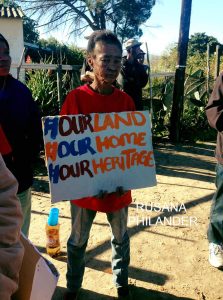…and Big Farmers Start Fighting Back with Eviction of Farm Workers.
South Africa’s Deputy Minister of Rural Development and Land Reform, Mr Mcebisi Skwatsha tells poor farm workers in the Western Cape Province:
“We will assist you to get land without compensation. The plight of farm workers are that after 24 years of freedom, they still have not experienced freedom. People on farms are being oppressed by some farmers. Farmers became rich off your sweet, but now they evict you from farms you lived your whole life on. If you stayed on that farm for a long time that land belongs to you.”
From Rusana Philander in Cape Town for TZ Business News.
As talk began about land expropriation without compensation on farms in the Western Cape, South Africa recently, a test case was identified, and one of important issues that came up was the high price the department of rural development and land reform has to pay for farms.
Farm workers in the Drakenstein municipality who arefacing eviction from farms, could be the first test case for land expropriation without compensation, in the Western Cape. The announcement was made recently by Deputy Minister of Rural Development and Land Reform, Mr Mcebisi Skwatsha, after he visited Simondium.
He was taken to farms in the area where he saw the conditions of farm workers who are facing eviction. The Deputy Minister said: “Their cases will be thrown into a basket of cases which will be looked at as test cases for land expropriation without compensation in the Western Cape Province.
“After hearing that a possible 20,000 farm workers in the Drakenstein municipality are facing evictions, we decided to do something about it. The constitution allows us to expropriate land without compensation.
 “We will assist you to get land without compensation. The plight of farm workers are that after 24 years of freedom, they still have not experienced freedom. People on farms are being oppressed by some farmers. Farmers became rich off your sweet, but now they evict you from farms you lived your whole life on. If you stayed on that farm for a long time that land belongs to you,” he said.
“We will assist you to get land without compensation. The plight of farm workers are that after 24 years of freedom, they still have not experienced freedom. People on farms are being oppressed by some farmers. Farmers became rich off your sweet, but now they evict you from farms you lived your whole life on. If you stayed on that farm for a long time that land belongs to you,” he said.
“An official from the Drakenstein municipality told us during a meeting that they were expecting the large scale farm evictions in the Drakenstein municipality. During the meeting the official Lauren Waring, said about 20,000 people were expected to be evicted from farms,” Carmen Louw from Women on Farms said.
She said the best they could do was to offer the people who will be evicted material to build informal structures. And that they are preparing service sites for the 20,000 people. These informal structures will then be built in informal settlements.
The evictions come from court cases in which farmers have applied for eviction orders,” Louw said. The Drakenstein municipality includes the areas of Wellington, Paarl, Gouda and Simondium.
A member of the provincial legislature Nomi Nkondla, said: “According to research which was done by PLAAS (Poverty Land and Agrarian Studies) the prices for farms in the Western Cape are the highest. This means that when the department of rural development and land reform buys land from farm owners we have to pay exorbitant prices for land. This means that there is not a lot of money left for land reform,” she said.
During a community meeting in Simondium the Human Rights Commissioner Chris Nissen said, the dignity of farm workers was being violated on a daily basis. “I don’t understand how magistrates can grant eviction orders and say people understand the ESTA Act (Extension of Security of Tenure Act), because when people sign these orders they make crosses. Meaning that they cannot read and write. As the Human Rights Commission we have a mandate from the constitution to protect people’s rights,” he said.
Nissen also said millions of people have been evicted off farms since 1994. “In the Cape Winelands area there are between 1, 400 and 1,800 cases in court. It is really a concern because farm evictions are so inhumane,” he said.
In a research paper written by Professors Ben Cousins and Ruth Hall from PLAAS, they said it was important to note that in terms of the constitution, land reform is not only about restitution for those affected after 1913.
“But also about security of tenure and land redistribution to ensure access to land on an equitable basis. Expropriation (with or without compensation) is one available means to achieve land redistribution, security of tenure and land restitution, all of which are in the public interest,” Nissen said.
He said in terms of land reform without compensation, “we have not used the power at our disposal to drive land reform via expropriation. Expropriation without compensation is already implicitly provided for in the property clause. While section 25(3) requires ‘just and equitable’ compensation to be payable in cases of expropriation, and this could mean no compensation, if we can show that it is just and equitable not to pay. We believe we can. Also, we have an over-ride clause that mandates transformation.”
The Drakenstein municipality has denied the large scale evictions.
In a press release, they said ” Drakenstein Municipality is aware of 1,127 cases in Drakenstein of which 434 are currently in court, as the municipality is normally cited as a respondent in court applications related to evictions. It is unclear how households could be affected. When it comes to evictions Drakenstein municipality’s role, depending on the court order granted, is to provide alternative emergency accommodation when people are being evicted.”




